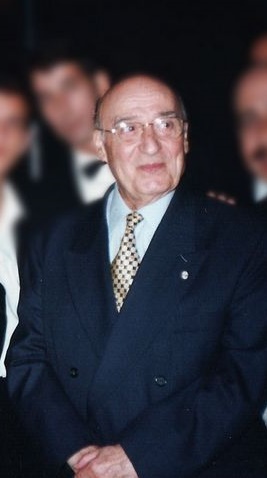Wadih El Safi facts for kids
Quick facts for kids
Wadih El Safi
|
|
|---|---|
 |
|
| Background information | |
| Native name |
وديع الصافي
|
| Birth name | Wadih Bishara Yousef Francis وديع بشارة يوسف فرنسيس |
| Also known as | Sawt Lobnan Al Khaled (The Immortal Voice of Lebanon), Al I'mlak Al Loubnani (The Lebanese Giant) |
| Born | November 1, 1921 Niha, Lebanon |
| Died | October 11, 2013 (aged 91) Mansourieh, Lebanon |
| Genres | Tarab, Folk |
| Occupation(s) | Singer, songwriter, composer, instrumentalist |
| Instruments | Oud |
| Years active | 1938–2013 |
Wadih El Safi (Arabic: وديع الصافي) was a famous Lebanese singer, songwriter, and composer. He was born as Wadih Francis on November 1, 1921, and passed away on October 11, 2013. Many people saw him as a true symbol of Lebanon and a pioneer in the country's music.
Wadih El Safi sang for 75 years, making him one of the longest-performing singers ever. He was considered the best singer of his time. Other musicians looked up to him because he mastered many singing styles. He also created new types of music that became part of Lebanon's musical heritage.
Wadih El Safi began his music journey at 16. He entered a singing contest on Lebanese Radio. He won first place among 40 other singers.
Contents
Wadih El Safi's Singing Style
Wadih El Safi was known for his powerful singing voice. He used a technique called "belting," which means singing loudly and strongly. His voice could reach high notes, but he was generally considered a Baritone. This means his voice was deeper than a tenor but higher than a bass.
One of his most famous songs is "Lebnan Ya Ote'et Sama" (meaning "Lebanon, Oh Piece of Sky"). In this song, you can hear his voice shift to higher, fuller notes. He became famous at 17 after winning a singing competition.
His Musical Journey
Wadih El Safi started writing and performing songs inspired by his childhood in the countryside. He loved traditional melodies. He mixed these old sounds with modern city music. This helped create a new kind of Lebanese folk music.
In 1947, El Safi traveled to Brazil. He stayed there until 1950. He toured the world, singing in many languages. These included Arabic, French, Portuguese, and Italian. His son George often joined him on these tours.
Popular Songs and Recordings
Wadih El Safi sang over 5,000 songs during his career. He was especially famous for his mawawil. These are a type of improvised singing style. Some examples are 'Ataba, Mijana, and Abu el Zuluf.
He also performed and recorded music with other well-known Lebanese artists. These included Fairouz and Sabah.
Later Life and Passing
In 1990, Wadih El Safi had open-heart surgery. His health began to decline in his later years. In 2012, he broke his leg and needed another surgery.
In 2013, he was admitted to the hospital. He was suffering from a lung infection. On October 11, 2013, he became ill at his son's home. He was rushed to the Bellevue Medical Center, where he passed away. His funeral was held on October 14, 2013, at Saint George Maronite Cathedral, Beirut.
Honoring Wadih El Safi
On November 1, 2016, Google honored Wadih El Safi. They celebrated what would have been his 95th birthday with a special Google Doodle.
Music by Wadih El Safi
As a Performer
- Best of Wadi – Vol. 1 (1999)
- Best of Wadi – Vol. 2
- Best of Wadi – Vol. 3
- Inta Omri (2000)
- The Two Tenors:Wadi Al Safi Aad Sabah Fakhri (2000)
- Wadih El-Safi and José Fernandez
- Wetdallou Bkheir
- Rouh ya zaman al madi atfal qana
- "W Kberna" Duet with Najwa Karam (2002)
- Chante Le Liban
- Wadi El Safi / Legends Of The 20th Century
- Mersal El Hawa
- Mahrajan Al Anwar
- Youghani Loubnan
- Ajmal El Aghani
As a Composer
- Cantiques de l'Orient (1996)
- Psaumes Pour Le 3ème Millénaire (2002)
Playing the Oud
- Music of Arabia, with Hanaan and her ensemble (as Wadih El-Saffi on oud)
See also
 In Spanish: Wadih Al Safi para niños
In Spanish: Wadih Al Safi para niños
 | Jewel Prestage |
 | Ella Baker |
 | Fannie Lou Hamer |

